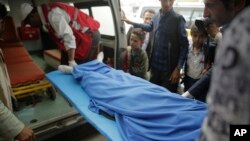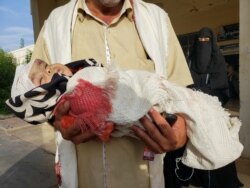The U.N. children’s fund reports 10,000 children in Yemen have been killed or maimed since conflict erupted in March 2015 between the Saudi Arabia-backed government and Iranian-supported Houthi rebels.
UNICEF calls this a “shameful milestone.” Since the war began, it says four children caught in the fighting have been killed or maimed every day. While the figure of 10,000 deaths and injuries is a lot, the children’s agency says the number is much higher.
UNICEF spokesman James Elder said only cases verified by the United Nations are listed in this latest tally. He said many more child deaths and injuries go unrecorded.
As high as these numbers are, he said many more children die from indirect, preventable causes than from the fighting itself. He said children are at risk of dying or falling seriously ill from diseases such as cholera and measles, as well as acute malnutrition and hunger.
“A child dies in Yemen of something that is preventable every 10 minutes. And that is certainly a number that unfortunately has not changed in the last couple of years…Yemen is the most difficult place in the world to be a child. Incredulously, it is getting worse,” said the spokesman.
Elder, who has just returned from a mission to Yemen, said children are exposed to many dangers. He said four out of every five children, or more than 11 million children, need humanitarian assistance. He said 400,000 children suffer from severe acute malnutrition and millions more lack clean drinking water. He said more than two million children are out of school.
The UNICEF spokesman said Yemen’s economy is collapsing and people are struggling to survive.
“But people like this are simply out of options. They are selling their jewelry. They are selling their cooking pots. They are doing this to feed their own children. The bottom line is children in Yemen are starving because adults continue to wage a war in which children are the biggest losers,” said Elder.
UNICEF says it urgently needs more than $235 million to continue its lifesaving work in Yemen until mid-2022. Otherwise, it warns it will be forced to reduce or stop its vital assistance for vulnerable children.
What this means is crucial therapeutic feeding for thousands of severely acutely malnourished children will be scaled down or stopped.
UNICEF says other lifesaving measures also will be affected. If the money dries up, it says survivors of this brutal war may no longer have access to safe drinking water, to COVID-19 vaccination programs, to psychosocial support to help people deal with trauma, and other essential relief.





